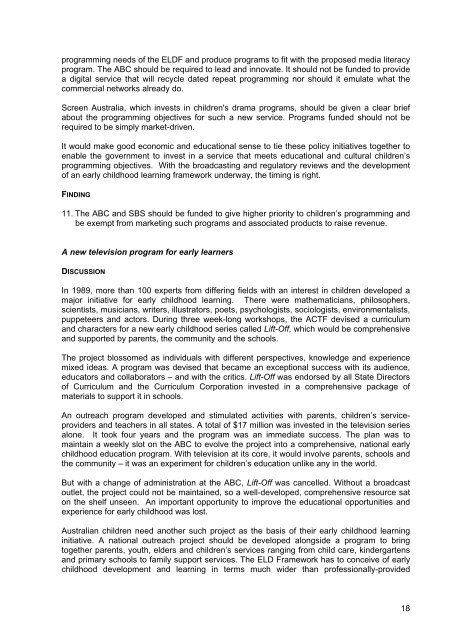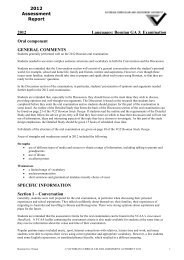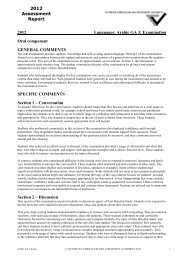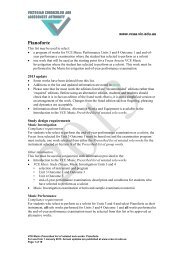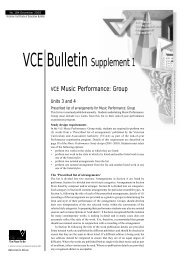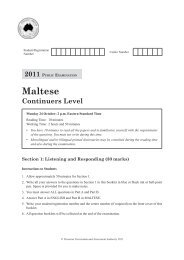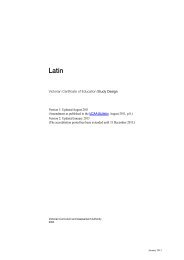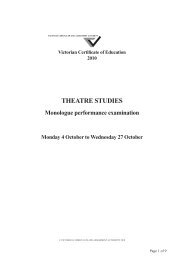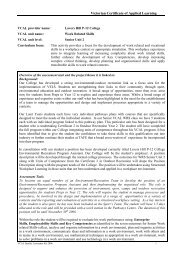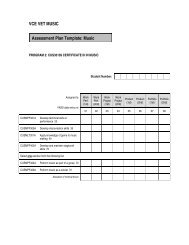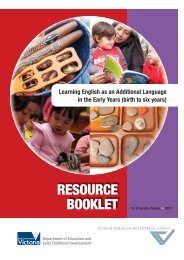television, digital media and children's learning - Victorian ...
television, digital media and children's learning - Victorian ...
television, digital media and children's learning - Victorian ...
You also want an ePaper? Increase the reach of your titles
YUMPU automatically turns print PDFs into web optimized ePapers that Google loves.
programming needs of the ELDF <strong>and</strong> produce programs to fit with the proposed <strong>media</strong> literacy<br />
program. The ABC should be required to lead <strong>and</strong> innovate. It should not be funded to provide<br />
a <strong>digital</strong> service that will recycle dated repeat programming nor should it emulate what the<br />
commercial networks already do.<br />
Screen Australia, which invests in <strong>children's</strong> drama programs, should be given a clear brief<br />
about the programming objectives for such a new service. Programs funded should not be<br />
required to be simply market-driven.<br />
It would make good economic <strong>and</strong> educational sense to tie these policy initiatives together to<br />
enable the government to invest in a service that meets educational <strong>and</strong> cultural children’s<br />
programming objectives. With the broadcasting <strong>and</strong> regulatory reviews <strong>and</strong> the development<br />
of an early childhood <strong>learning</strong> framework underway, the timing is right.<br />
FINDING<br />
11. The ABC <strong>and</strong> SBS should be funded to give higher priority to children’s programming <strong>and</strong><br />
be exempt from marketing such programs <strong>and</strong> associated products to raise revenue.<br />
A new <strong>television</strong> program for early learners<br />
DISCUSSION<br />
In 1989, more than 100 experts from differing fields with an interest in children developed a<br />
major initiative for early childhood <strong>learning</strong>. There were mathematicians, philosophers,<br />
scientists, musicians, writers, illustrators, poets, psychologists, sociologists, environmentalists,<br />
puppeteers <strong>and</strong> actors. During three week-long workshops, the ACTF devised a curriculum<br />
<strong>and</strong> characters for a new early childhood series called Lift-Off, which would be comprehensive<br />
<strong>and</strong> supported by parents, the community <strong>and</strong> the schools.<br />
The project blossomed as individuals with different perspectives, knowledge <strong>and</strong> experience<br />
mixed ideas. A program was devised that became an exceptional success with its audience,<br />
educators <strong>and</strong> collaborators – <strong>and</strong> with the critics. Lift-Off was endorsed by all State Directors<br />
of Curriculum <strong>and</strong> the Curriculum Corporation invested in a comprehensive package of<br />
materials to support it in schools.<br />
An outreach program developed <strong>and</strong> stimulated activities with parents, children’s serviceproviders<br />
<strong>and</strong> teachers in all states. A total of $17 million was invested in the <strong>television</strong> series<br />
alone. It took four years <strong>and</strong> the program was an im<strong>media</strong>te success. The plan was to<br />
maintain a weekly slot on the ABC to evolve the project into a comprehensive, national early<br />
childhood education program. With <strong>television</strong> at its core, it would involve parents, schools <strong>and</strong><br />
the community – it was an experiment for children’s education unlike any in the world.<br />
But with a change of administration at the ABC, Lift-Off was cancelled. Without a broadcast<br />
outlet, the project could not be maintained, so a well-developed, comprehensive resource sat<br />
on the shelf unseen. An important opportunity to improve the educational opportunities <strong>and</strong><br />
experience for early childhood was lost.<br />
Australian children need another such project as the basis of their early childhood <strong>learning</strong><br />
initiative. A national outreach project should be developed alongside a program to bring<br />
together parents, youth, elders <strong>and</strong> children’s services ranging from child care, kindergartens<br />
<strong>and</strong> primary schools to family support services. The ELD Framework has to conceive of early<br />
childhood development <strong>and</strong> <strong>learning</strong> in terms much wider than professionally-provided<br />
18


